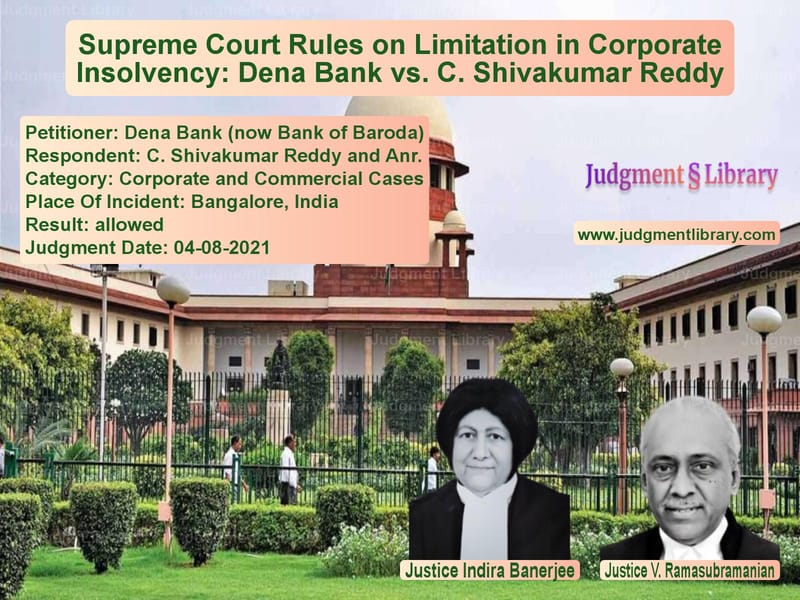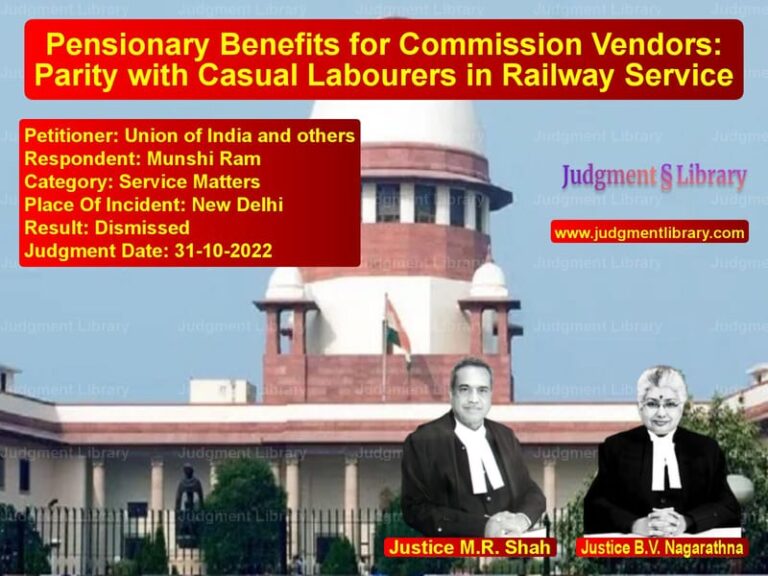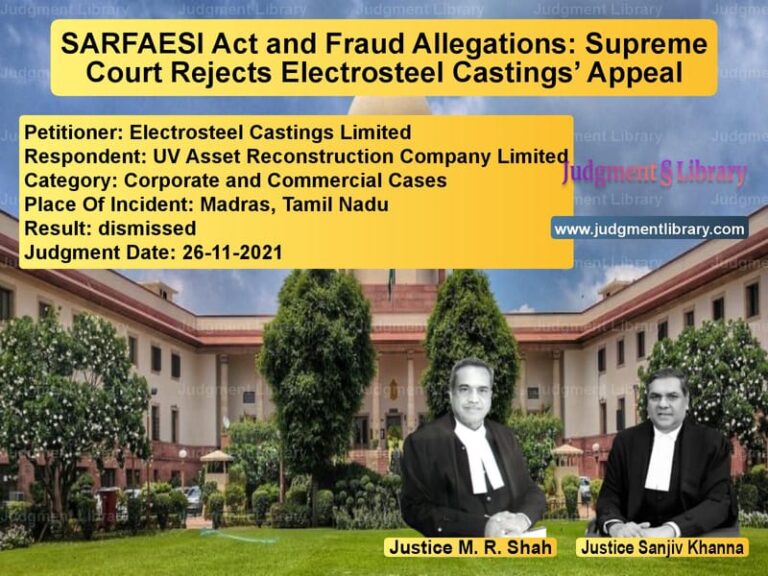Supreme Court Rules on Limitation in Corporate Insolvency: Dena Bank vs. C. Shivakumar Reddy
The case of Dena Bank (now Bank of Baroda) vs. C. Shivakumar Reddy & Anr. deals with crucial legal questions regarding the limitation period under the Insolvency and Bankruptcy Code, 2016 (IBC). The Supreme Court had to determine whether an application under Section 7 of the IBC could be barred by limitation due to a delay in filing, despite the presence of acknowledgments of debt and a decree from the Debt Recovery Tribunal (DRT).
The appeal arose from a decision by the National Company Law Appellate Tribunal (NCLAT), which ruled that the corporate insolvency resolution process (CIRP) against the corporate debtor was barred by limitation. However, the Supreme Court overturned this ruling and clarified several aspects of limitation law in insolvency proceedings.
Background of the Case
The dispute originated when Dena Bank (now merged with Bank of Baroda) sanctioned a loan of Rs. 45 crore to the corporate debtor in December 2011. The repayment was to be made in 24 quarterly installments. However, the corporate debtor defaulted, and the loan account was declared a Non-Performing Asset (NPA) on December 31, 2013.
Following this default, Dena Bank initiated various recovery proceedings:
- A legal notice was issued to the corporate debtor on December 22, 2014, demanding Rs. 52.12 crore.
- An application under the Recovery of Debts and Bankruptcy Act, 1993 was filed before the Debt Recovery Tribunal (DRT) in Bangalore on January 1, 2015.
- The corporate debtor made a one-time settlement (OTS) offer on March 3, 2017, which was rejected.
- On March 27, 2017, the DRT passed a final judgment against the corporate debtor, directing it to pay Rs. 52.12 crore with interest.
- A Recovery Certificate was issued on May 25, 2017, formalizing the bank’s right to recover the amount.
Petitioner’s Arguments
Dena Bank argued that:
- The corporate debtor had repeatedly acknowledged its liability, extending the limitation period under Section 18 of the Limitation Act.
- The acknowledgment included a letter from the corporate debtor dated January 5, 2015, where it sought restructuring of the loan.
- The balance sheets of the corporate debtor for 2016-17 and 2017-18 reflected the outstanding dues.
- The one-time settlement (OTS) proposal dated March 3, 2017 was also an acknowledgment of liability.
- The DRT judgment and subsequent Recovery Certificate issued in May 2017 gave rise to a fresh cause of action.
Respondent’s Arguments
The corporate debtor countered that:
- The Section 7 application under IBC was filed on October 12, 2018, more than five years after the NPA declaration, making it time-barred.
- The NCLAT correctly ruled that mere settlement offers and balance sheets do not constitute an acknowledgment of debt under Section 18 of the Limitation Act.
- The petition lacked any clear pleading regarding acknowledgment of debt.
- Allowing the petition would go against the intent of the IBC, which aims for quick resolutions.
Key Legal Issues
The Supreme Court examined the following questions:
- Whether a Section 7 application under IBC would be barred by limitation merely because it was filed more than three years after the declaration of NPA?
- Whether an acknowledgment of liability (such as a balance sheet entry or a one-time settlement offer) could extend the limitation period under Section 18 of the Limitation Act?
- Whether a final judgment and Recovery Certificate issued by the DRT constituted a fresh cause of action for filing a Section 7 petition?
Court’s Observations
The Supreme Court made several important observations:
- Section 18 of the Limitation Act applies to IBC proceedings. Any acknowledgment of liability within three years from the date of default extends the limitation period.
- A balance sheet reflecting outstanding debt qualifies as an acknowledgment of liability, extending the limitation period.
- The corporate debtor’s OTS proposal from March 3, 2017, was a clear acknowledgment of liability.
- The DRT’s final order on March 27, 2017, and the Recovery Certificate dated May 25, 2017 gave rise to a fresh cause of action.
Final Verdict
The Supreme Court ruled in favor of Dena Bank and held that:
- The application under Section 7 of the IBC was not barred by limitation.
- The NCLAT had erred in dismissing the petition without considering acknowledgments of debt.
- A Recovery Certificate provides a new three-year limitation period for filing an IBC petition.
- The petition was validly filed within three years of the Recovery Certificate.
Thus, the Supreme Court set aside the NCLAT’s decision and allowed the insolvency proceedings against the corporate debtor to continue.
Implications of the Judgment
This ruling has significant implications for financial creditors:
- Extension of Limitation: Creditors can use balance sheets, settlement proposals, and DRT judgments to extend limitation periods.
- Fresh Cause of Action: A Recovery Certificate resets the limitation period for initiating insolvency proceedings.
- Protection for Creditors: The judgment prevents defaulting corporate debtors from escaping liability due to technical limitations.
Overall, this judgment strengthens the rights of financial creditors under the IBC while ensuring that corporate debtors cannot exploit legal technicalities to evade insolvency proceedings.
Petitioner Name: Dena Bank (now Bank of Baroda).Respondent Name: C. Shivakumar Reddy and Anr..Judgment By: Justice Indira Banerjee, Justice V. Ramasubramanian.Place Of Incident: Bangalore, India.Judgment Date: 04-08-2021.
Don’t miss out on the full details! Download the complete judgment in PDF format below and gain valuable insights instantly!
Download Judgment: dena-bank-(now-bank-vs-c.-shivakumar-reddy-supreme-court-of-india-judgment-dated-04-08-2021.pdf
Directly Download Judgment: Directly download this Judgment
See all petitions in Bankruptcy and Insolvency
See all petitions in Corporate Compliance
See all petitions in Company Law
See all petitions in Mergers and Acquisitions
See all petitions in Corporate Governance
See all petitions in Judgment by Indira Banerjee
See all petitions in Judgment by V. Ramasubramanian
See all petitions in allowed
See all petitions in supreme court of India judgments August 2021
See all petitions in 2021 judgments
See all posts in Corporate and Commercial Cases Category
See all allowed petitions in Corporate and Commercial Cases Category
See all Dismissed petitions in Corporate and Commercial Cases Category
See all partially allowed petitions in Corporate and Commercial Cases Category







